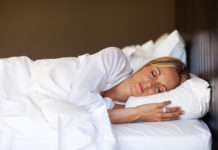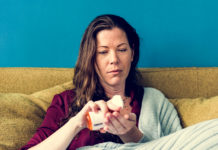Do you or a loved one stay up all night listening to your partner snore loudly? You may be completely unaware of your evening snoring and unless it is disturbing someone else, you may not be overly concerned about the reasons behind the snoring. However, loud and frequent snoring can be a sign of something more serious.
Sleep apnea is a common disorder that affects more than 18 million American adults and is potentially serious if left untreated. Sleep apnea affects the way you breathe when sleeping. It happens when the breathing stops and starts repeatedly throughout the evening of rest. The first steps to restful sleep include learning how to recognize warning signs, understanding treatment options, and different prevention methods.
Types of Sleep Apnea
There are three different types of sleep apnea: obstructive, central, and complex. Obstructive sleep apnea is the most common type, characterized by loud snoring. This occurs when the soft tissue at the back of your throat relaxes during sleep and blocks your airway. Next is central sleep apnea, which involves the central nervous system. This less common form of sleep apnea is caused by the nervous system miscommunicating with the muscles that control breathing. When your brain and muscles don’t send the signals correctly, they cause breathing to stop and start again. Individuals with central sleep apnea rarely snore. Lastly, complex sleep apnea is another more rare type, which is a combination of the first two types.
During an episode of sleep apnea, the breathing during sleep stops and starts repeatedly. These breathing pauses can last between 10 – 20 seconds and can occur multiple times during each evening. Most typically, this type of disturbance in breathing can jolt an individual awake and cause major inconsistencies in the sleep rhythm. While the breathing is paused, oxygen in the blood drops dramatically. The brain is signaled as oxygen is low and jump starts the system again to resume breathing. This often happens with a gasp or choking sound, and the individual is sometimes completely unaware of the awakenings.
Symptoms
Symptoms of the different types of sleep apnea overlap, making it difficult to determine the type without a sleep study. Also, as mentioned before, unless the snoring is disturbing your bed partner, you may not realize that you have this condition.
Some symptoms may indicate a serious problem is occurring. Symptoms of both obstructive and central sleep apnea include:
- Excessive daytime sleepiness (hypersomnia)
- Loud snoring
- Episodes of breathing cessation during sleep (witnessed by another person)
- Abrupt awakenings accompanied by shortness of breath
- Awakening with dry mouth or sore throat
- Morning headache
- Difficult staying asleep (insomnia)
- Attention problems
Risk Factors and Diagnosis
Many factors may increase the risks of sleep apnea. Men are more likely than women to have the condition and it affects many people who are overweight. Age is not a factor since sleep apnea can occur at any age, however risk does increase as you get older. Family history can play a large role as well. Individuals with small airways of the nose, throat, and mouth are more likely to be at risk for sleep apnea. Congestion, allergies, and enlarged tonsils also raise the risk.
Individuals that smoke, have diabetes, high blood pressure or heart failure are also linked to sleep apnea. About half of the people who have sleep apnea also have one of these conditions.
If you or a loved one is suffering from the symptoms listed above, or have a family history of sleep apnea, it’s important to see a doctor for proper diagnosis. If you feel that you’re having sleep troubles, first consider keeping a sleep diary for a few weeks. When you go to your doctor’s appointment, bring the diary with you so you’re able to report all of the symptoms and time frame of onset properly. Be sure to make a note of all of the potential risk factors that may increase or decrease symptoms. It may also be necessary to bring a family member or someone who has witnessed your sleeping symptoms in order to report on instances that you are not aware of happening during sleep.
The doctor will perform a physical examination and check your nose, throat, and mouth for swollen tissue, congestion, or abnormalities. They will check the soft palate, uvula, and tonsils to make sure that everything is normal. They may also order a sleep study to measure how your body responds to sleep problems. The test will determine many things including brain activity, eye movement, heart rate, and blood pressure. Sleep studies are the most accurate way to diagnosis sleep apnea. There are different types of sleep studies, some which are completed in an office under physicians’ supervision, and others that can be performed at home with a home-based portable sleep monitor that records information imperative to making a diagnosis.
Dangers of Sleep Apnea
Due to the multiple times during the evening that sleep apnea awakens an individual, their body never gets the chance to fall into a deeper sleep. Natural sleep rhythm is disturbed and consequently, the individual spends more time in a light sleep. This doesn’t allow for restorative sleep to occur, which can cause chronic sleep deprivation and many other health risks. Slow reflexes, poor concentration, and increased risk of accidents can occur more commonly in individuals suffering from this condition.
Those suffering from sleep apnea also have increased risks of other health disorders such as high blood pressure, heart disease, stroke, and weight gain. Sudden drops in oxygen levels increase blood pressure and can strain your cardiovascular system. Obstructive sleep apnea increases your risk for stroke due to the sudden stops and starts in breathing and the amount of time that oxygen is not reaching the brain.
Another major concern for individuals with sleep apnea is complications with medications or surgery. Due to the breathing complications, individuals that are undergoing surgery or are more prone to breathing problems when they are laying on their backs or sedated should make sure the doctor is aware before anesthesia.
Children with untreated sleep apnea may be more prone to hyperactivity and may be diagnosed with ADD or ADHD. Mood swings, depression, and daytime fatigue are also common risks associated with sleep apnea.
Treatments and Prevention
There are multiple treatment options for those individuals suffering from sleep disorders. With a combination of lifestyle changes as well as holistic therapies, diagnosed individuals can start to sleep better and have a healthier life. Self-care may be the most appropriate treatment plan for individuals. The following helpful tips can get you on the right track to prevent and treat symptoms of sleep apnea:
1. Lose Weight
Excess weight can greatly contribute to individuals having symptoms including snoring, excess throat tissue, and issues regulating body temperature that can cause sleep disturbances. Eating healthy and regular exercise can help shed the extra pounds. Of course, when changing your diet or exercise regimen, consult a doctor in order to seek the best course of action and do so safely.
2. Avoid Alcohol and Sleep Medications
Sleep medication, tranquilizers, and alcohol relax the muscles in the back of your throat which can cause your tongue and soft palate to rest against the back of your throat, blocking the airway. This blockage can exacerbate sleep apnea, along with the awakening and disturbance of sleep.
3. Sleep on Your Side or Abdomen
By changing your position during sleep away from lying on your back, your tongue and soft palate do not have a chance to block your airway as they would if you slept on your back.
4. Quit Smoking
Not only does smoking put you at risk for many other diseases such as lung cancer, high blood pressure, and heart attacks, but smoking also worsens obstructive sleep apnea. Smoking also decreases the amount of oxygen in the blood. Nicotine can also increase risk of heart failure or other risk factors associated with sleep apnea. So why wait? Quit smoking now!
5. Keep Nasal Passages Open at Night
If you suffer from allergies or congestion, consider using a nasal decongestant to decrease obstructive sleep apnea symptoms and keep nasal passages open. Consult a doctor about these medications because in most cases, they are only recommended for short-term use. Another alternative is to use a nasal saline spray to keep passages clear.
Alternative Therapies
Other alternative therapies to CPAP machines while sleeping could include oral devices to prevent the collapse of tongue and soft tissues in the back of the throat. Other devices such as a Night Shift device help to alert an individual when their sleep position is putting them at risk for sleep apnea symptoms. These devices are placed at the back of the neck, using vibration to alert when the position changes from the back to the side or stomach.
Holistic remedies may also include supplements of vitamins and minerals to improve deficiencies in individuals suffering some symptoms. Research reveals that a majority of individuals who complain of sleep apnea symptoms also have deficiencies in vitamin D3, vitamin C and magnesium. Therapeutic vitamin D3 consumption has been found to decrease and eliminate sleep apnea symptoms in some patients. Vitamin C has been studied by the American Journal of Respiratory and Critical Care Medicine journal to reduce damage from sleep apnea and may reverse cell damage. Sufficient magnesium levels are needed for muscle regulation in the throat.
If you do not have significant sleep apnea, herbal remedies can also help various sleeping issues like insomnia. Lavender and California Poppy are two of the best safe remedies to effectively relieve insomnia symptoms. The soothing aroma of lavender promotes relaxation and encourages the body to wind down, while releasing tension. California Poppy is a distant relative to opium poppy and was used by early Native Americans as both food and medicine. This herb contains sedative alkaloids and helps to soothe sleepless individuals into slumber. This herb does not cause drowsiness in the morning like many over-the-counter drugs do.
For my patients who have insomnia without sleep apnea, I recommend Diamond Nutritionals’ Sleep Support Formula, an all natural sleep supplement. Just two taken an hour before bedtime ensures a restful night’s sleep with no daytime drowsiness.
Conclusions
Overall, it is important for your body to get the best rest possible for restoration. Sleep deprivation can lead to many health risks, which can be life-threatening if left untreated. If you or a loved one have suspicions of sleep apnea symptoms, seek a medical professional for proper diagnosis and treatment. Snoring may seem normal, but it could be taking a great toll on you and your loved one’s life. Remember, it is unacceptable to not be getting the best sleep possible each night. As always, contact your physician before starting or stopping medications, exercise regimen, or diets.
—
Photo credit: Rachel Tayse / CC BY 2.0








